What is SAP SCM?
In this blog, we will discuss everything there is to know about the SAP SCM blog, including its many advantages, perks, features, and other aspects.
Overview, Introduction to SAP SCM
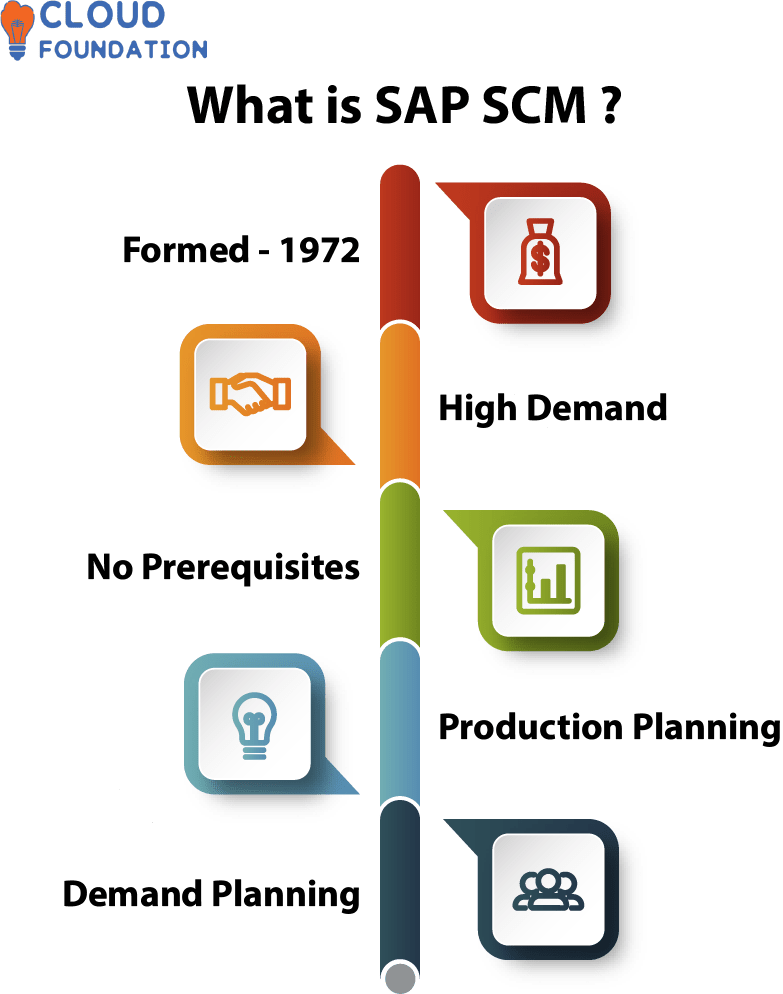
SAP Supply Chain Management is an all-inclusive suite of integrated apps created to aid businesses in attaining operational excellence, cost optimization and increased client happiness.
It was specifically created to streamline supply chain processes so as to produce more profitable environments.
SAP SCM definition OR Define SAP SCM
Organizations can utilize SAP SCM solutions to make sure they’re maximising resources and earnings to their fullest extent, with these comprehensive solutions offering maximum efficiency for maximum returns on investments.

Optimizing their supply chain operations enables businesses to reduce errors and enhance customer and product satisfaction, benchmark their performance against peers’ and identify inefficient areas through automated systems, thus creating best practices within their supply chains and driving success for business operations overall.
What does SAP SCM do?
Efficient planning, management and control of resources required to provide goods and services to customers enable businesses to run smoothly.
SAP SCM performs tasks such as analyzing client requirements, developing production plans, creating purchase orders, managing sales orders and inventory levels efficiently, tracking quality levels as well as scheduling transportation services and keeping tabs on supplier deliveries on an ongoing basis.
In addition, this module offers solutions for supply chain performance management such as intelligence planning solutions as well as operational planning capabilities including inventory optimization for sales execution purposes.
What is SAP SCM used for?
With features and capabilities such as sourcing, demand forecasting, inventory control management, transportation reporting, provides users with an effective means for monitoring and evaluating the entire supply chain.
As it provides openness and visibility into supply chains, this software serves as a conduit between users and customers while consolidating inventory from various sources and thoroughly analyzing each component’s requirements.

SAP SCM also utilizes Machine Learning and Predictive Analysis Tools, utilizing them to increase overall customer satisfaction while decreasing costs and speeding time to market.
By helping companies predict accurately client requests, product availability and market trends more precisely it increases proactivity as well as the likelihood of timely deliveries of high quality items.
In addition, this platform automates demand planning activities like order fulfillment and procurement ensuring orders arrive on time with accuracy while decreasing manual labor requirements.
SAP for SCM or Sap for Supply Chain Management
As organizations compete to stay profitable in today’s business environment, supply chain management must keep pace. To do this, organizations need cutting-edge technologies, an enterprise resource planning (ERP) system like SAP offers great supply chain solutions.
Businesses can streamline the entire supply chain process from production to delivery with SAP SCM’s comprehensive supply chain solutions for planning, execution and optimization of supply chains.
Companies can manage all aspects of product supply from procuring raw materials through delivery using this cutting-edge ERP system.
Organizations may implement their solutions gradually while reaping immediate and demonstrable advantages from only optimizing selected areas, for instance implementing simple optimization solutions swiftly while postponing more involved SCM components for later.

Organizations equipped with comprehensive supply chain insight can Quickly Recognize Issues and act to resolve them before they cause significant disruptions, while seizing opportunities as they emerge to increase productivity and profits.
SAP in SCM or SAP in Supply Chain Management
It is essential to many businesses and can make managing your supply chains simpler with SAP’s optimization of each procedure step and visibility into your supply chains.
Thanks to this technology, businesses may seamlessly connect the entirety of their supply chains, improving collaboration among firms.
Furthermore, this tool enables firms to track inventory levels at multiple locations to ensure sufficient supplies exist to satisfy customer demands.
Businesses benefit greatly from having real-time updates of inventory levels to more effectively schedule replenishment orders and ensure they always have enough stock on hand.
Through an automated order system, inventory levels can easily be managed, orders completed quickly and efficiently while order management software enables businesses to monitor shipments, customer demand trends and orders at every step.

SAP SCM features an innovative Demand Forecasting Solution to assist businesses in anticipating client demand and planning accordingly.
Using historical data as its basis, companies may more accurately anticipate customer requirements by developing practices using demand forecasting tools like these, companies can then ensure they always have enough in stock without running short on supplies or overstocking on inventory.
SAP SCM Full Form or SCM Full Form in SAP
SAP SCM has produced this business software to increase profitability and operational effectiveness for any organization.
An inventory management system with various features that help organizations understand inventory levels and product offerings to optimize service and production efficiency is now available.
Companies using SAP SCM can better plan for the future and respond more rapidly to changes in the market by better understanding all supply chain operations.
SAP SCM also facilitates the automation and streamlining of various other processes, including order entry, invoicing and returns. Thanks to its automated features and robust analytics/reports features, businesses can minimize manual intervention while optimizing resource use, helping ensure increased profitability.
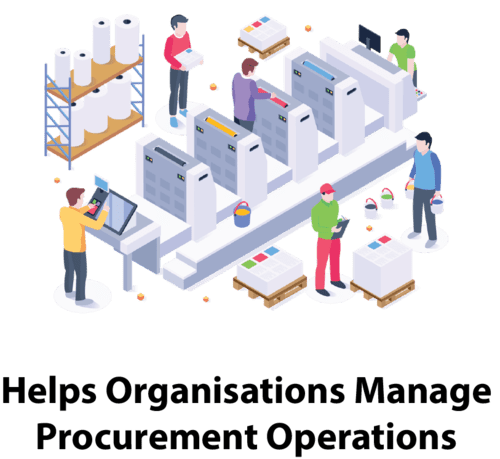
SAP SCM helps organizations Manage Various Procurement Operations such as purchasing logistics inventory control supplier management.
How does SAP SCM work?
SAP SCM provides companies with a set of tools designed to assist in planning, carrying out, monitoring and optimizing operations to increase effectiveness while decreasing costs.
As an all-inclusive system it covers purchasing, inventory control, warehouse space utilization planning , logistics demand planning as well as production planning .
SAP SCM Modules
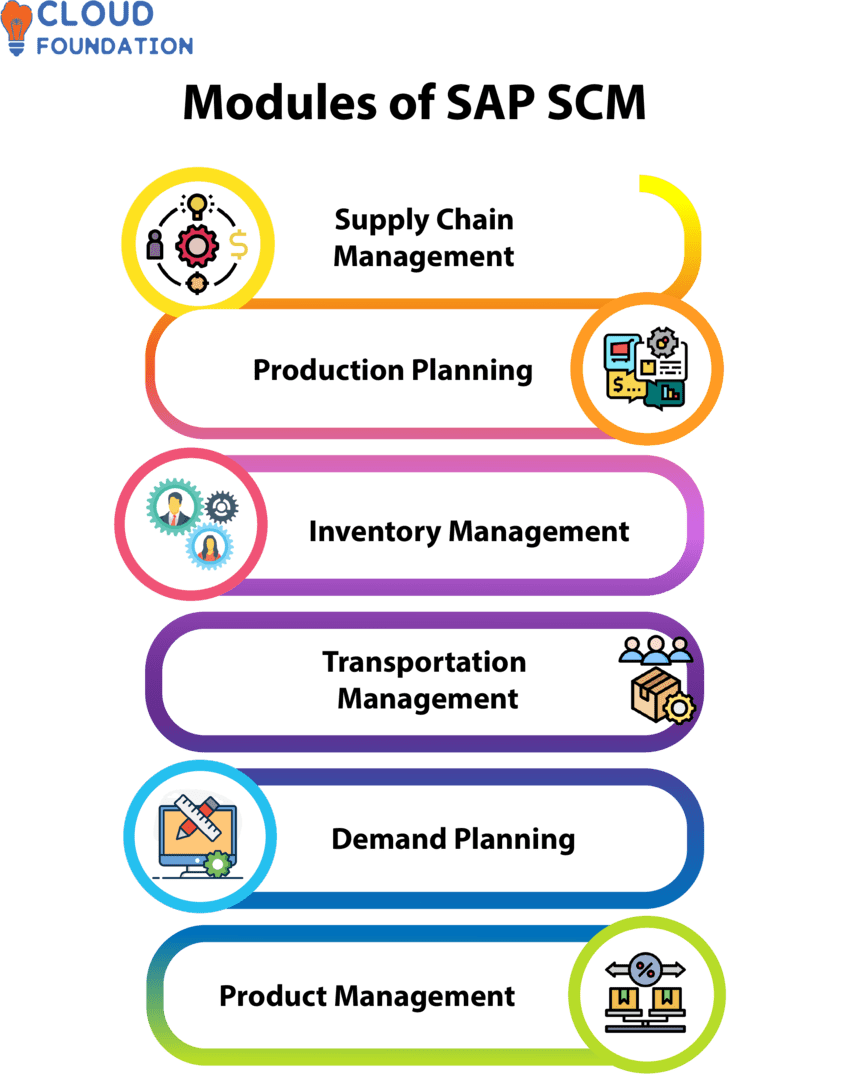
Supply Chain Management: Users are able to effectively plan and oversee their supply chains. By tracking orders, reviewing stock levels, and forecasting future demand estimates – users are able to ensure client needs are quickly fulfilled while inventory stays within acceptable levels.
Production Planning: People can manage and plan their production efficiently. It offers capacity forecasts, production schedule planning and operational optimization features – providing visibility and control over how plans are executed.
Inventory Management: This module aids users in monitoring and adequately overseeing current inventory levels as well as optimizing them to save costs while increasing profits. In addition, expenses are managed while functions including pick-packing, yard management and route optimization are offered.
Transportation Management: Users can effectively and efficiently coordinate their transport needs and improve routes within their transport network.
Demand Planning: It empowers users to strategically and precisely plan demand for resources, products and services. Customers can use it to produce precise demand estimations while exploring purchasing trends and patterns as well as improving reordering processes.
Product Management: It assists users in monitoring a product from its conception through retirement, giving users access to data regarding product performance and costs that allows for analysis. Continuous monitoring keeps an eye on every step from creation through retirement of products.
5 Components of Supply Chain Management
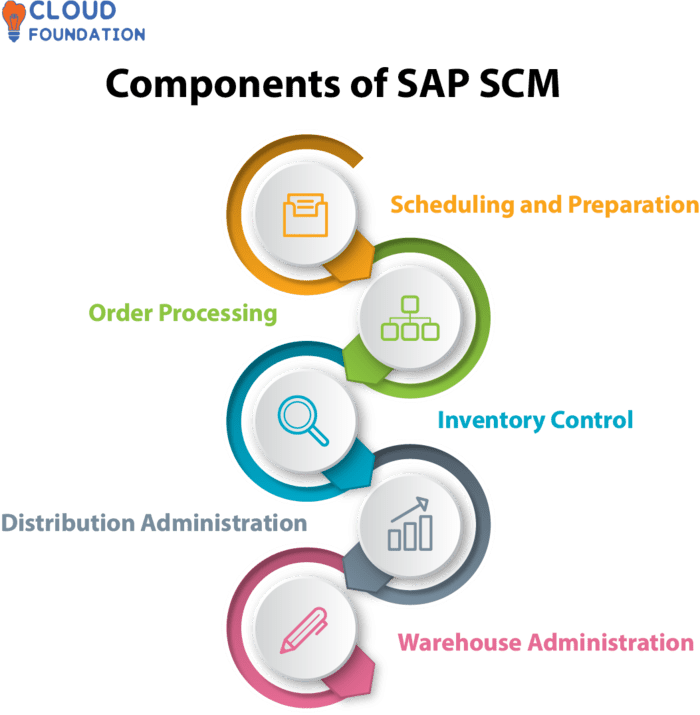
Scheduling and Preparation: Companies may model their supply chains using SAP SCM Planning and Scheduling module and ensure everything is going according to plan using this part of their system, complete with analytics tools and performance indicators that show real-time data for accurate decision making and optimal preparation for anticipated dynamics.
Order Processing: Order processing is one of the core elements of SAP SCM that allows businesses to centrally manage orders from various sales channels, with tools for order creation and management as well as supporting procedures like shipping/receiving/packing/financial accounting.
Inventory Control: Businesses can leverage SAP SCM’s Inventory Management module for real-time tracking of inventory levels and forecasting future production demands with automated planning features as well as material inflow/outflow monitoring features.
Distribution Administration: Businesses can utilize an optimizer designed to cut delivery times and expenses for maximum benefit.
Warehouse Administration: Businesses can monitor all operations related to warehouse operations using SAP SCM’s Warehouse Management module, providing for inbound and outgoing operations while optimizing labor resources and available storage spaces.
SAP SCM Tutorial
Businesses require agile supply chain skills in today’s digital era in order to remain competitive.
Due to globalization, organizations face pressure from global competition on all fronts to quickly adapt operations and processes in response to changes in international markets with top customer service levels remaining constant across regions and continentsgives businesses access to technology and resources needed for this.

SAP SCM helps Organizations Maintain Competitive Edge by offering insights and visibility they require when effectively managing supply chains.
Utilizing SAP SCM can bring many advantages for businesses. They can reduce procurement expenses while optimizing inventory management with its capabilities.
Additionally, it gives companies an edge against rivals through providing supply chain optimization capabilities and prompt customer response capabilities.
Why SAP SCM?
With its help they may monitor supplier performance, expenses and resource availability.
Businesses can leverage SAP SCM to identify inefficiencies within their supply chains quickly and easily using real-time data analysis.
By quickly providing insight into possible waste areas and quickly providing solutions quickly, businesses can make informed decisions regarding how well their supply chains are functioning.

Businesses may Reduce Wasteful Expenses caused by ineffective supply chain procedures while optimizing inventory levels and increasing efficiency by merging data from various supply chain segments.
Furthermore, this solution allows organizations to eliminate ineffective practices from within the supply chain which cost unnecessary money in inefficiencies costs.
They can adapt swiftly and find opportunities for improvement by measuring and assessing each link of their supply chains, and doing this regularly ensures they remain profitable while outstripping competitors.
SAP SCM is an established and trustworthy system. Businesses using it can rest easy knowing that data related to their supply chains is secure.
Businesses can leverage real-time insights from supply chain networks into how operations and expenses can be optimized and reduced with this comprehensive system of real-time data and insights, offering real time optimization of operations as well as cost savings.
Businesses looking to enhance performance will appreciate its extensive features and reliable security as they seek an edge against rival businesses.
Benefits of SAP SCM
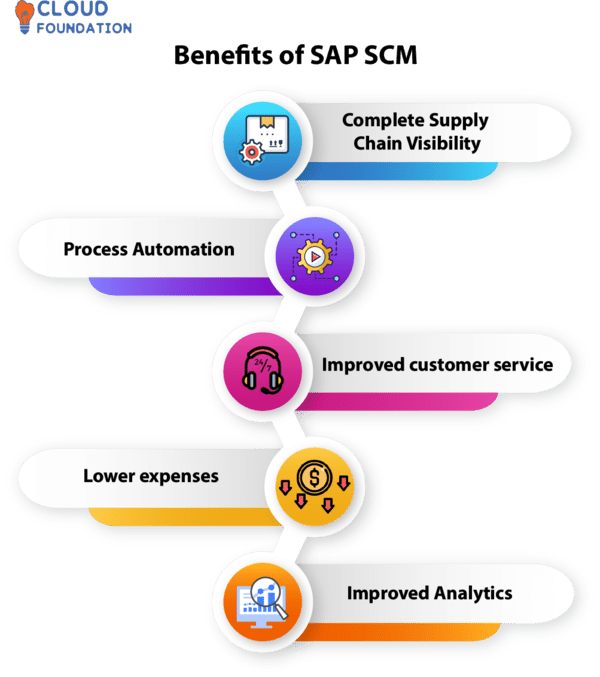
Complete Supply Chain Visibility: SAP SCM provides real-time monitoring and control over supply chains, helping enterprises manage suppliers, consumers, inventory levels, lead times and overall visibility with greater ease.
Process Automation: SAP SCM assists supply chain operations by streamlining and automating supply chain activities such as manufacturing, logistics and fulfilment processes. Part of this includes automating manufacturing, distribution and fulfilment processes as part of this effort.
Improved customer service: By giving businesses access to real-time stock availability and price data, SAP SCM allows enterprises to deliver superior customer service.
Lower expenses:SAP SCM helps organizations manage expenses more effectively by giving managers real-time visibility of their supply chains, giving managers real-time insight into costs, enabling cost savings to occur more efficiently, thereby decreasing wastefulness.
Improved Analytics: Businesses using SAP SCM’s sophisticated analytics and business intelligence features can take better decisions and optimize their supply chains more easily than before.
SAP SCM Software
It is an enterprise-grade suite of cloud and on-premise applications developed to address supply chain management requirements of companies.
SAP SCM encompasses demand planning, material requirement planning (MRP), warehouse management, inventory control management and distribution as critical elements.
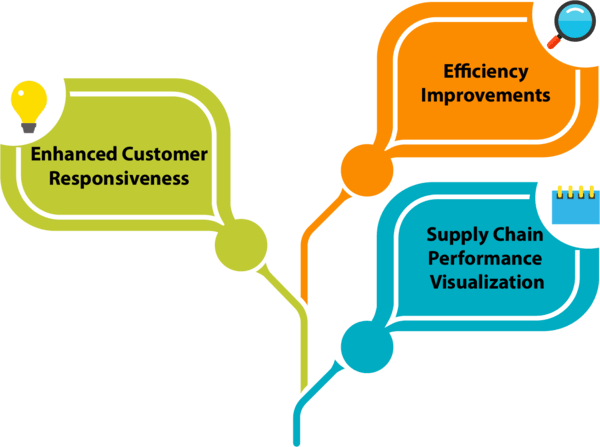
SAP SCM deployment brings several key benefits, such as Enhanced Customer Responsiveness and Efficiency Improvements as well as better Supply Chain Performance Visualization.
Businesses can lower costs while improving supply chain agility with it by making more informed decisions regarding supply chain management.
As SAP SCM is highly configurable and scalable to suit different organizational sizes, it may be utilized by both small businesses and giant corporations alike.
Furthermore, linking other platforms such as CRM or ERP enables seamless operation in multi-platform settings.
How To Use SAP SCM?
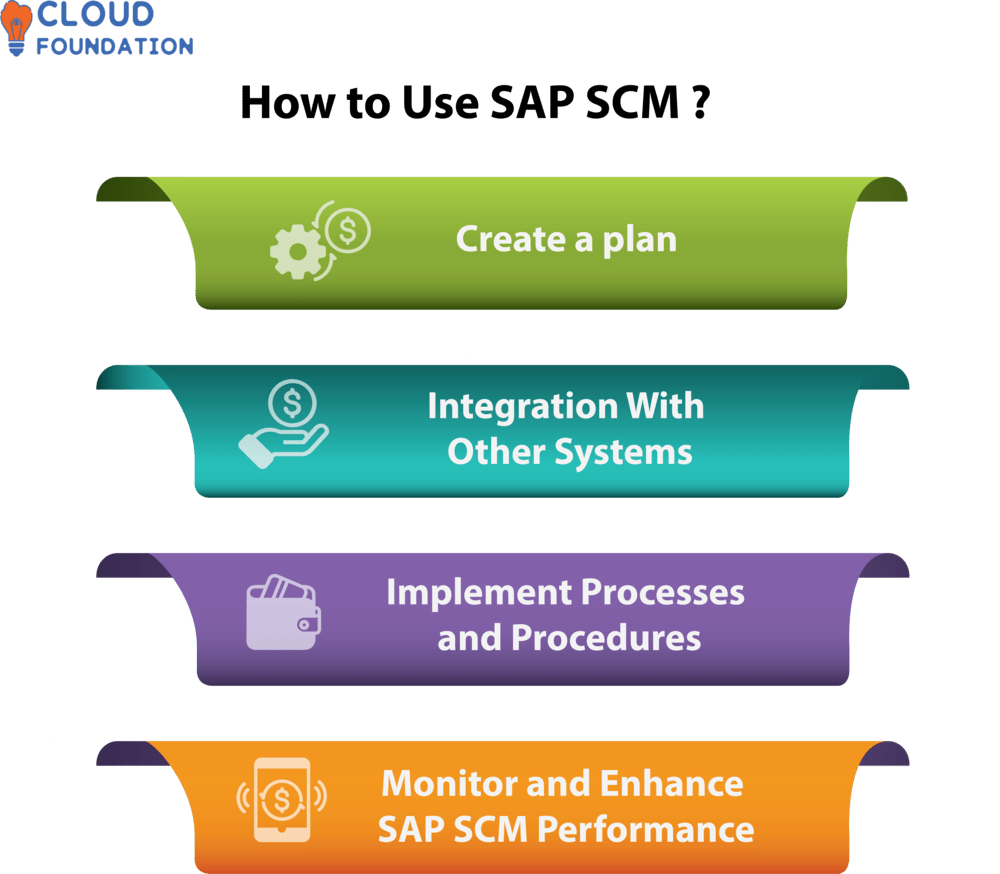
SAP SCM enterprise resource planning software offers robust supply chain management features.
Follow these steps for successful SAP SCM :
Create a plan: The initial step in adopting SAP SCM should be creating a plan. In order to manage your supply chain efficiently, this requires you to establish which procedures should be automated as well as desired outcomes and desired results.
Setting up the system for data processing, reporting and analytics as well as creating accounts with various user roles and security features are among the many tasks required to meet this goal.
Integration With Other Systems: As part of Step Two, connect SAP SCM to any existing systems you might already possess like ERPs, business software and finance programs in order to integrate data from all these sources and manage everything on one single platform. This will make management much simpler.
Implement Processes and Procedures: After system setup, the next stage involves setting preferences, automating operations and integrating your system with other systems. This involves the following.
Monitor and Enhance SAP SCM Performance: In the final stage, monitoring and improving SAP SCM performance requires data analysis and KPIs to uncover improvement areas and make any required modifications or alterations.
SAP SCM Features
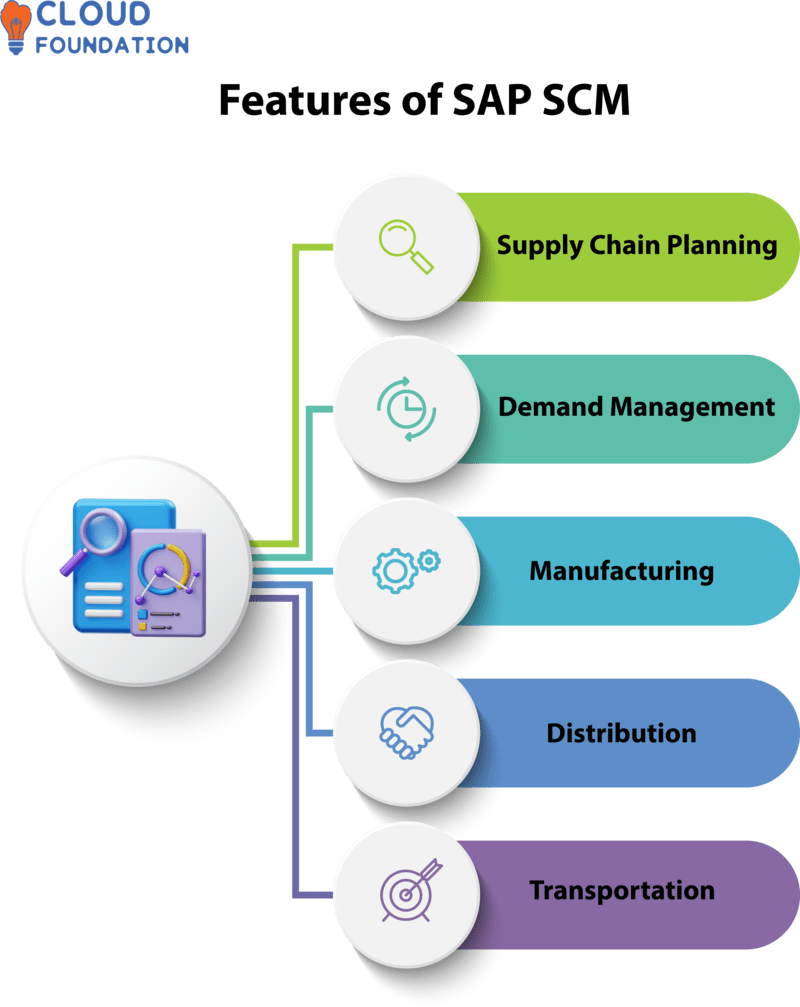
Supply Chain Planning: With this SAP module, businesses can more effectively organize and plan their supply chain activities. Users can estimate demand and optimize inventory levels more accurately through this planning tool.
Demand Management: Utilizing this module, businesses can accurately predict consumer demand to produce products at just the right moment and minimise inventory levels by managing promotions effectively and optimizing inventory levels.
Manufacturing: This module assists businesses in overseeing their production process to ensure supplies and goods reach all locations quickly, affordably and promptly. Furthermore, this feature helps with waste reduction as well as optimizing manufacturing process efficiency.
Distribution: This module helps businesses in improving the management of their routes of distribution more effectively, by handling customer service inquiries, tracking orders and monitoring inventory levels more efficiently as well as optimizing routes cost effectively.
Transportation: This module assists businesses in the efficient management of their transportation operations by aiding customers with routing optimization, cargo tracking and monitoring delivery times as well as cutting transportation expenses.
What are the best ways to learn SAP SCM?

Organizations now understand how essential it is for them to have an efficient supply chain system as their technology and data demands move into the cloud. With that, learning SAP SCM becomes even more essential.
Start learning SAP SCM right from scratch using CloudFoundation’s comprehensive training platform and gain all of the knowledge and skills required to effectively optimize and debug your supply chain management process.
With certified teachers providing real-time instruction, you will quickly develop the abilities required to manage supply chains of any size with SAP SCM.
SAP SCM online training modules cover the fundamental concepts and elements of SAP SCM as well as understanding its challenges involved with supply chains from start to finish. You have full access to our cloud-based learning platform so that you can study anytime, wherever or at your own speed.
To gain a better grasp of SCM fundamental principles, easily switch between learning modes available across SCM training modules available on demand.
CloudFoundation SAP Supply Chain Management Course gives you the chance to explore in depth all its nuances, moving past fundamental supply chain management concepts towards understanding all its capabilities comprehensively.

Ankita
Author



